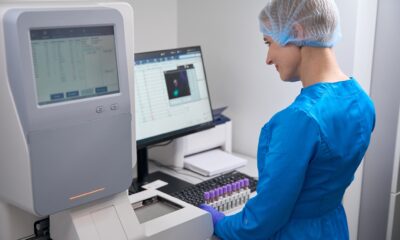Healthtech
AI-Powered Personalized Medicine: Tailoring Treatments for Each Patient

Introduction
The traditional “one-size-fits-all” approach to medicine is rapidly evolving. With advancements in artificial intelligence (AI) and big data analytics, healthcare is entering an era of personalized medicine—where treatments are tailored to an individual’s unique genetic makeup, lifestyle, and medical history. AI-driven personalized medicine is revolutionizing how diseases are diagnosed, treated, and prevented, promising more effective and precise healthcare solutions.
But how exactly does AI contribute to personalized medicine? Can it truly transform patient care? This article explores the role of AI in tailoring treatments, its benefits, challenges, and what the future holds for precision healthcare.
What is AI-Powered Personalized Medicine?
Personalized medicine, also known as precision medicine, aims to customize treatments based on an individual’s genetic profile, biomarkers, environment, and lifestyle. AI enhances this approach by analyzing vast datasets to detect patterns, predict disease progression, and recommend targeted treatments.
AI-powered personalized medicine leverages:
- Genomic sequencing to identify genetic predispositions.
- Machine learning models to predict disease risks.
- AI-driven drug discovery for targeted therapies.
- Wearable devices and IoT sensors for real-time health monitoring.
- Natural language processing (NLP) to analyze medical literature and patient data.
How AI is Revolutionizing Personalized Medicine
1. AI-Driven Genomic Analysis for Tailored Treatments
Genomics plays a critical role in personalized medicine by analyzing an individual’s DNA to determine disease susceptibility and drug response. AI can rapidly process vast genomic datasets, uncovering genetic mutations linked to diseases such as cancer, Alzheimer’s, and rare genetic disorders.
🔹 Example:
IBM Watson for Genomics uses AI to scan a patient’s genetic profile and recommend targeted cancer therapies, reducing trial-and-error treatments.
🔹 Outcome:
More precise and effective treatments with fewer side effects.
2. Predicting Disease Risk with AI Models
AI can identify high-risk individuals by analyzing medical records, lifestyle choices, and genetic markers. Machine learning algorithms detect early warning signs of chronic diseases like diabetes, heart disease, and neurodegenerative disorders.
🔹 Example:
Deep learning models from Google’s DeepMind predict kidney disease progression 48 hours in advance, allowing early intervention.
🔹 Outcome:
Preventive care strategies that reduce hospitalizations and improve long-term health outcomes.
3. AI in Drug Discovery and Targeted Therapy
Developing new drugs is expensive and time-consuming. AI accelerates drug discovery by analyzing molecular structures, predicting drug interactions, and identifying new drug candidates for specific genetic profiles.
🔹 Example:
BenevolentAI and DeepMind’s AlphaFold use AI to design drugs tailored to individual genetic variations, speeding up drug development for diseases like cancer and Parkinson’s.
🔹 Outcome:
Faster, cost-effective drug discovery and highly personalized treatments.
4. Personalized Cancer Treatment with AI
Cancer treatments vary in effectiveness depending on an individual’s genetic profile. AI helps oncologists design personalized cancer therapies by matching patients with treatments based on tumor genetics.
🔹 Example:
Tempus, an AI-driven precision medicine platform, uses genomic sequencing and clinical data to recommend targeted therapies for cancer patients.
🔹 Outcome:
Improved survival rates and reduced side effects by eliminating ineffective treatments.
5. AI-Powered Wearables and Remote Health Monitoring
Smartwatches, fitness trackers, and IoT health devices collect real-time data on heart rate, blood pressure, glucose levels, and more. AI analyzes this data to detect anomalies, predict medical emergencies, and recommend personalized health interventions.
🔹 Example:
Apple Watch’s AI-powered ECG feature detects irregular heart rhythms, potentially preventing strokes and heart attacks.
🔹 Outcome:
Early disease detection, proactive health management, and reduced hospital visits.
6. AI-Enhanced Medical Imaging for Precise Diagnoses
Medical imaging powered by AI can detect diseases such as cancer, heart conditions, and neurological disorders with greater accuracy than traditional methods. AI identifies subtle anomalies in MRI, CT scans, and X-rays, leading to early and precise diagnoses.
🔹 Example:
AI-driven imaging tools like PathAI and Qure.ai assist radiologists in diagnosing diseases faster and more accurately.
🔹 Outcome:
Faster detection of diseases, leading to early and more personalized treatment plans.
Challenges of AI-Powered Personalized Medicine
1. Data Privacy and Security Risks
Personalized medicine relies on vast amounts of sensitive patient data. Ensuring cybersecurity and compliance with data protection regulations (e.g., HIPAA, GDPR) is crucial to prevent breaches.
2. High Costs of AI Implementation
AI-driven precision medicine requires investment in advanced computing, data storage, and AI training models, making it costly for some healthcare providers.
3. Algorithm Bias and Ethical Concerns
AI models may exhibit biases based on incomplete or skewed datasets, leading to disparities in treatment recommendations. Ethical guidelines must be established to ensure fair and unbiased AI-driven healthcare.
4. Integration with Existing Healthcare Systems
Many hospitals and clinics still use legacy IT systems that may not be compatible with AI-driven personalized medicine. Upgrading infrastructure is a major hurdle.
The Future of AI-Powered Personalized Medicine
The future of personalized medicine will be driven by:
- AI-Integrated EHR Systems: Seamless AI integration with electronic health records for real-time treatment recommendations.
- Nanotechnology and AI Synergy: Smart nanodevices that deliver drugs directly to affected cells based on AI analysis.
- AI-Powered Virtual Health Assistants: Chatbots and AI-driven apps that provide real-time health insights and lifestyle recommendations.
- Blockchain for Secure Health Data Sharing: Enhancing security and accessibility of patient records for personalized treatment.
Conclusion
AI-powered personalized medicine is transforming healthcare by tailoring treatments to individual patients, improving accuracy, and enhancing disease prevention. From genomic sequencing and AI-driven drug discovery to smart wearables and medical imaging, AI is paving the way for a future where treatments are highly customized, efficient, and accessible.
However, challenges such as data security, costs, and ethical concerns must be addressed to ensure AI-driven healthcare benefits everyone. As AI continues to advance, personalized medicine will become the standard of care, shifting from reactive treatments to proactive, patient-specific interventions.
The question is no longer if AI will personalize medicine—it’s how quickly it will become a global healthcare standard.
Healthtech
The Future of Smart Pills: How Ingestible Sensors Can Improve Treatment Adherence

The rapid evolution of medical technology continues to redefine patient care, and one of the most promising innovations is the development of smart pills—ingestible sensors designed to improve treatment adherence. Medication noncompliance is a critical issue in healthcare, leading to worsened medical conditions, increased hospitalizations, and higher healthcare costs. Smart pills aim to revolutionize how medications are monitored and managed, ensuring that patients receive the full benefits of their prescribed treatments.
What Are Smart Pills?
Smart pills, or digital pills, are pharmaceutical capsules embedded with tiny ingestible sensors that track medication intake. These sensors communicate with an external wearable device, which then transmits data to a smartphone app or directly to healthcare providers. The information collected includes when the medication was taken and whether the prescribed dosage was followed.
These ingestible sensors are typically made from biocompatible materials, ensuring they are safe for consumption. Once ingested, they interact with stomach acids to generate a signal that is picked up by a receiver, confirming medication intake.
The Importance of Treatment Adherence
One of the biggest challenges in modern medicine is ensuring that patients take their medications as prescribed. According to the World Health Organization (WHO), approximately 50% of patients with chronic illnesses do not adhere to their medication regimens. This lack of adherence leads to disease progression, preventable hospitalizations, and an estimated $100 billion in avoidable healthcare costs annually.
Smart pills offer a solution by providing real-time monitoring and reminders to patients. By ensuring that medications are taken correctly, these pills can help improve health outcomes, particularly for individuals managing chronic conditions such as diabetes, hypertension, and mental health disorders.
Benefits of Smart Pills
- Improved Medication Adherence – Patients receive real-time notifications and reminders, reducing the likelihood of missed doses.
- Enhanced Doctor-Patient Communication – Healthcare providers can track patient adherence remotely, allowing for personalized interventions and adjustments.
- Early Detection of Health Issues – Smart pills can collect data on how a patient’s body responds to medication, offering insights that may help detect early signs of complications.
- Reduced Healthcare Costs – By preventing complications due to nonadherence, smart pills can lower hospital admissions and emergency care expenses.
- Better Management of Clinical Trials – In research settings, smart pills can provide accurate data on medication adherence, improving the reliability of clinical trial results.
Challenges and Ethical Considerations
Despite their potential, smart pills also pose several challenges. Privacy concerns are among the most significant, as these devices collect sensitive health data. Ensuring that this data is securely stored and used ethically is crucial. Additionally, some patients may feel uncomfortable with the idea of being monitored, raising concerns about autonomy and medical surveillance.
Another challenge is cost. As with any emerging technology, the initial implementation of smart pills may be expensive, limiting access for lower-income populations. However, as the technology advances and becomes more widespread, costs are expected to decrease.
The Future of Smart Pills
The future of smart pills is promising, with continued advancements in miniaturization, biocompatibility, and data security. Researchers are also exploring how smart pills can be integrated with artificial intelligence (AI) to provide predictive insights and personalized treatment plans.
Additionally, pharmaceutical companies are investing in partnerships with tech firms to improve smart pill technologies, making them more accessible and efficient. As regulatory bodies refine guidelines for their safe and ethical use, smart pills could soon become a standard part of medication management worldwide.
Conclusion
Smart pills represent a groundbreaking step in healthcare innovation, addressing one of the most pressing issues in medicine—treatment adherence. While challenges remain, their potential to improve patient outcomes, reduce healthcare costs, and enhance medical research is undeniable. As technology continues to evolve, smart pills may soon become an essential tool in personalized medicine, ensuring that patients get the most from their treatments.
Healthtech
The Role of Robotics in Surgery: Are We Ready for Fully Autonomous Surgeons?

Surgical robotics has revolutionized modern medicine, enhancing precision, reducing recovery times, and improving patient outcomes. With advancements in Artificial Intelligence (AI) and machine learning, the possibility of fully autonomous robotic surgeons is no longer just science fiction—it is becoming a reality. But are we truly ready for robots to operate without human intervention? This article explores the current state of surgical robotics, the benefits and risks of automation in surgery, and the ethical and technological challenges that must be addressed before fully autonomous surgeons become a reality.
The Evolution of Surgical Robotics
The introduction of robot-assisted surgery has transformed the operating room. The Da Vinci Surgical System, one of the most well-known robotic surgical platforms, enables surgeons to perform minimally invasive procedures with enhanced precision. However, it is still entirely controlled by human surgeons.
Over time, AI has been integrated into surgical robotics, allowing for:
- Real-time decision support – AI can analyze imaging data and assist surgeons in identifying abnormalities.
- Automation of repetitive tasks – Robots can suture, cauterize, and even perform delicate incisions with greater steadiness than human hands.
- Machine learning adaptation – AI systems can learn from past surgeries to refine techniques and improve efficiency.
Despite these advancements, we have not yet reached the point where robotic systems can perform complex surgeries independently.
Are We Ready for Fully Autonomous Surgeons?
The Case for Fully Autonomous Surgical Robots
The potential benefits of autonomous surgical systems are significant:
- Unmatched Precision and Stability
- AI-driven robots can eliminate human hand tremors, ensuring greater accuracy in delicate procedures such as microsurgery and neurosurgery.
- Machine learning algorithms can analyze vast amounts of surgical data to refine techniques and avoid errors.
- 24/7 Availability and Scalability
- Unlike human surgeons, autonomous robots do not experience fatigue, stress, or emotional distractions.
- They could be deployed in remote locations and underserved areas where skilled surgeons are scarce.
- Reduced Risk of Human Error
- Studies show that human errors contribute to a significant percentage of surgical complications. Robots operating with AI precision could minimize mistakes, leading to better patient outcomes.
- Faster and More Efficient Procedures
- AI-powered robotic systems can perform repetitive surgical tasks more efficiently, reducing operating times and allowing hospitals to treat more patients.
Challenges and Risks of Fully Autonomous Surgical Robots
Despite these advantages, several technological, ethical, and legal barriers prevent full autonomy in robotic surgery:
- Lack of Human Judgment and Adaptability
- Surgery is unpredictable—complications can arise that require on-the-spot decision-making.
- AI lacks the intuition and improvisation skills that experienced human surgeons possess.
- Accountability and Legal Liability
- If a fully autonomous robot makes a surgical mistake, who is responsible? The manufacturer, the hospital, or the software developers?
- Current medical laws and malpractice policies are not equipped to handle AI-driven surgeries.
- Cybersecurity Risks
- AI-driven surgical robots rely on data connectivity, making them vulnerable to hacking. A cyberattack on a surgical robot during an operation could have catastrophic consequences.
- Ethical Concerns
- Would patients trust a machine to operate on their bodies without human supervision?
- In life-or-death scenarios, should ethical decision-making be left to an algorithm?
- Technical Limitations
- AI still lacks the ability to handle highly complex, unpredictable surgical cases.
- Sensory limitations in robotic systems make it difficult for machines to assess tissue conditions in real-time, as human surgeons do through touch.
The Future: A Hybrid Approach
While fully autonomous robotic surgeons are not yet ready for mainstream use, a hybrid model—where AI assists human surgeons rather than replaces them—seems to be the more viable future. Collaborative surgical robots (cobots) could:
- Provide AI-driven guidance to human surgeons in complex procedures.
- Perform automated tasks such as suturing and tissue manipulation, reducing strain on surgeons.
- Enhance remote surgery (telesurgery), allowing expert surgeons to operate on patients in different locations via robotic systems.
Several AI-assisted robotic surgery projects are already shaping the future:
- STAR (Smart Tissue Autonomous Robot) – A robotic system that can perform autonomous soft tissue surgery with high precision.
- Google’s DeepMind AI – Being explored for AI-powered surgical planning and execution.
Conclusion: Will AI Replace Surgeons?
While AI and robotics will continue to transform surgery, fully autonomous surgeons remain a distant reality. The future of surgical robotics will likely be a human-AI collaboration, where machines enhance surgical precision while human expertise ensures safety and adaptability.
Before we can trust robots to perform surgery independently, we must overcome technological, ethical, and legal hurdles. Until then, robotic-assisted surgery will remain a powerful tool—but not a replacement—for human surgeons.
Final Thought
As AI and robotics advance, the question is not “Can robots replace surgeons?” but rather “How can robots and humans work together to achieve the best surgical outcomes?” The answer lies in responsible innovation, where AI serves as a partner in medicine, not a substitute for human expertise.
Healthtech
The Ethics of AI and Data Privacy in Healthcare Technology

Introduction
Artificial Intelligence (AI) is rapidly transforming healthcare, enabling advancements in predictive diagnostics, personalized medicine, robotic surgeries, and administrative automation. However, as AI integrates deeper into healthcare, it raises ethical concerns about data privacy, security, bias, and patient autonomy.
With vast amounts of sensitive medical data being processed daily—ranging from electronic health records (EHRs) to genetic information and real-time patient monitoring—ensuring data privacy has become a critical challenge. While AI-driven healthcare solutions promise improved efficiency and accuracy, they also pose risks related to unauthorized data access, surveillance, and algorithmic bias.
So, how can the healthcare industry balance innovation with ethical responsibility? This article explores the ethical dilemmas of AI in healthcare, the importance of data privacy, and solutions to ensure responsible AI use in medical technology.
1. The Ethical Challenges of AI in Healthcare
AI in healthcare raises profound ethical questions, primarily concerning privacy, bias, accountability, and consent. Here’s a breakdown of the key concerns:
🔹 1. Patient Data Privacy & Security Risks
AI systems rely on large-scale patient data for training and decision-making. However, storing and analyzing sensitive medical data increases the risk of cybersecurity threats, data breaches, and identity theft.
✅ Concerns:
- Who owns patient data—the individual, the hospital, or the AI company?
- How is patient data stored, shared, and protected from hacking?
- Can AI-driven predictive healthcare influence insurance premiums unfairly?
🔹 Example:
- In 2021, a cyberattack on the Irish Health Service Executive (HSE) led to a ransomware breach affecting millions of patient records.
Solution:
- Implement blockchain-based healthcare data security for encrypted, tamper-proof storage.
- Enforce HIPAA, GDPR, and data protection laws to ensure patient data remains confidential.
🔹 2. AI Bias & Discrimination in Healthcare
AI models trained on biased datasets can lead to discriminatory healthcare decisions, disproportionately affecting certain populations.
✅ Concerns:
- AI models may perform better on one racial or gender group while underperforming for others.
- Discriminatory AI could deny treatments or misdiagnose conditions for minority groups.
- Bias in AI-driven hiring and insurance models could reinforce healthcare inequalities.
🔹 Example:
- A 2019 study in Science found that an AI system used to allocate healthcare resources favored white patients over Black patients, leading to unequal access to care.
Solution:
- Ensure AI models are trained on diverse, representative medical datasets.
- Conduct independent audits and fairness tests before deploying AI in healthcare settings.
🔹 3. Ethical Concerns in AI-Powered Predictive Healthcare
AI can predict disease risks, mental health crises, and potential medical conditions before symptoms appear. While this is revolutionary, it also raises ethical concerns:
✅ Concerns:
- Should insurance companies have access to AI-predicted health risks before symptoms develop?
- Can AI-generated health predictions cause unnecessary panic or stress for patients?
- Will predictive healthcare affect life insurance policies and financial eligibility?
🔹 Example:
- Google’s DeepMind developed AI for early kidney disease detection, but patients were unaware that their data was being used, raising concerns about informed consent.
Solution:
- Implement patient-informed consent protocols for AI-driven predictions.
- Allow patients to opt-out of AI risk profiling in medical decision-making.
🔹 4. AI and the Loss of Human Oversight in Healthcare
AI is now assisting in diagnostic imaging, robotic surgeries, and virtual health assessments. While AI improves efficiency, can it replace human judgment?
✅ Concerns:
- Can AI make life-and-death medical decisions without human intervention?
- Will AI reduce doctor-patient interactions, affecting trust and empathy?
- How do we ensure accountability when AI systems make errors?
🔹 Example:
- In 2020, an AI-powered diagnostic tool misclassified lung cancer stages, leading to improper treatment plans.
Solution:
- Implement “Human-in-the-Loop” (HITL) AI models, ensuring human oversight for critical medical decisions.
- Require AI transparency so healthcare providers can verify AI decision-making.
2. Data Privacy & Security: Safeguarding Healthcare AI
To maintain trust and ethical integrity in AI-driven healthcare, data privacy must be a top priority. Here’s how data security can be strengthened:
🔹 1. Blockchain for Encrypted Health Records
Blockchain provides decentralized, tamper-proof storage, ensuring secure patient data sharing.
✅ How Blockchain Enhances Data Privacy:
- Stores medical records on a distributed ledger, preventing data tampering.
- Uses smart contracts for patient-controlled data access, ensuring privacy.
🔹 Example:
- Estonia’s National Health System uses blockchain to secure all medical records, reducing data breaches.
Outcome: Patients regain control over their data, and hospitals ensure secure, transparent access.
🔹 2. AI-Powered Cybersecurity Against Medical Data Breaches
AI can detect anomalous activities in real-time, protecting healthcare institutions from cyberattacks and ransomware threats.
✅ AI-Powered Security Features:
- Anomaly Detection: Identifies unusual logins, access patterns, or data movement.
- Automated Encryption: AI encrypts sensitive medical records before unauthorized access occurs.
🔹 Example:
- IBM’s Watson for Cybersecurity uses AI to detect real-time cyber threats in hospitals.
Outcome: AI strengthens medical cybersecurity, reducing the risk of stolen patient records.
🔹 3. Data Anonymization for AI-Driven Medical Research
AI-driven genomic research and clinical trials require large-scale patient data. However, sharing raw patient data risks violating privacy laws.
✅ Solution: Data Anonymization
- Converts personal patient details into anonymous, non-traceable datasets.
- Ensures AI training models respect privacy laws while supporting medical research.
🔹 Example:
- The UK’s Genomics England Project anonymizes DNA data for AI-powered disease research.
Outcome: AI advances medical discoveries without compromising patient privacy.
3. The Future of Ethical AI in Healthcare
AI in healthcare will continue to evolve, but ethical safeguards must keep pace. By 2030, AI-powered healthcare will include:
🔹 AI-Powered Patient Consent Platforms – Patients will have complete control over data sharing through blockchain and smart contracts.
🔹 Global AI Ethics Regulations – Governments will implement standardized AI ethics laws for medical AI use.
🔹 Bias-Free AI in Medicine – AI training will involve more diverse datasets, ensuring fair, accurate healthcare for all populations.
🔹 AI-Human Collaboration Models – AI will enhance, not replace human healthcare professionals.
Ethical AI is the future of healthcare technology—ensuring innovation remains safe, fair, and patient-centric.
Conclusion
The ethics of AI and data privacy in healthcare must be prioritized to ensure trust, security, and fairness. While AI is revolutionizing healthcare with faster diagnostics, automation, and predictive insights, it also introduces data privacy risks, biases, and ethical concerns.
To create a responsible AI-driven healthcare future, institutions must:
✅ Strengthen AI data security with blockchain and encryption.
✅ Ensure AI fairness with diverse, bias-free training datasets.
✅ Adopt transparent AI models with human oversight.
✅ Empower patients with control over their medical data.
The goal is not just AI-powered healthcare—but ethically responsible, privacy-focused AI for all.
-

 Artificial Intelligence1 year ago
Artificial Intelligence1 year agoHow AI is Revolutionizing Medical Diagnoses: From Radiology to Pathology
-

 Artificial Intelligence1 year ago
Artificial Intelligence1 year agoCan AI Predict the Next Pandemic? AI in Epidemiology and Public Health
-

 Artificial Intelligence1 year ago
Artificial Intelligence1 year agoAI in Cancer Detection: How Machine Learning is Transforming Oncology
-

 Healthtech12 months ago
Healthtech12 months agoHow AI is Revolutionizing Diagnostics: Faster, Smarter, and More Accurate
-

 Healthtech12 months ago
Healthtech12 months agoThe Ethics of AI and Data Privacy in Healthcare Technology
-

 Healthtech12 months ago
Healthtech12 months agoThe Future of Smart Pills: How Ingestible Sensors Can Improve Treatment Adherence
-

 Management12 months ago
Management12 months agoNavigating Healthcare Regulations: How Compliance Affects Management Decisions
-

 Healthtech12 months ago
Healthtech12 months agoNanotechnology in Healthcare: The Future of Drug Delivery and Disease Treatment













